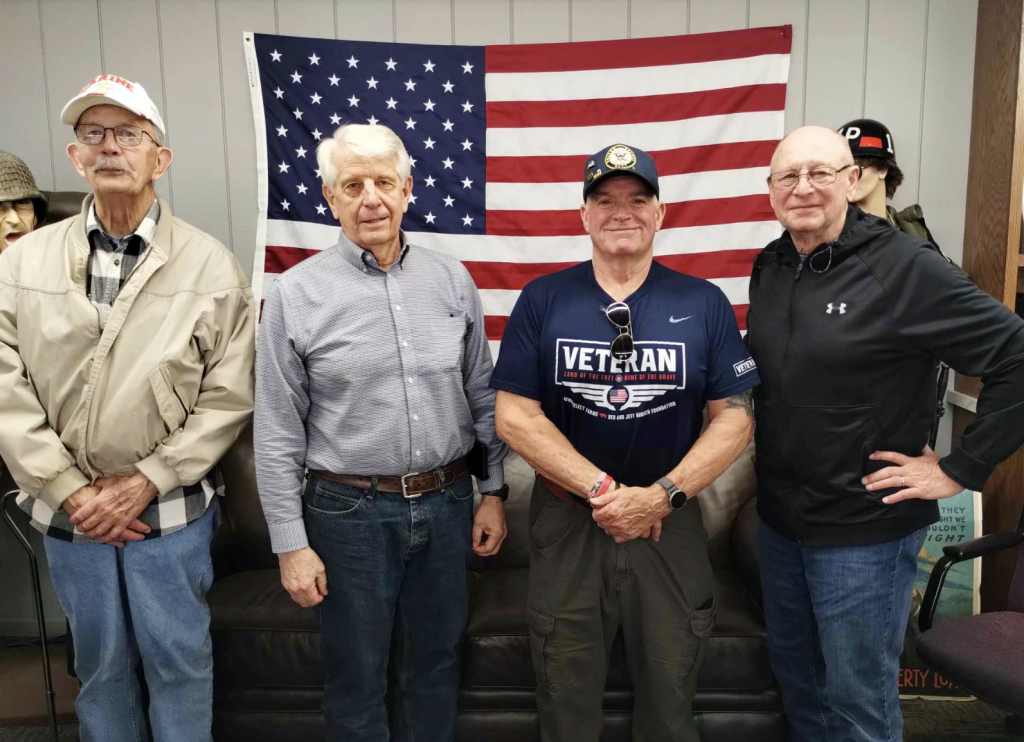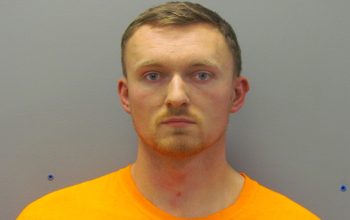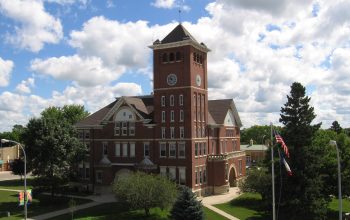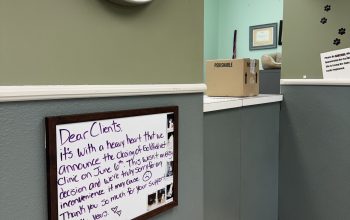by Jennifer Burnham, The Hampton Chronicle
Four Franklin County veterans gathered to share their stories with the Hampton Chronicle on Thursday, April 10, in remembrance of the 50th anniversary of the end of the Vietnam War, which took place on April 30.
The veterans: Greg Welsher, Don Latham, Jim Warwick, and Ron Schermer.
Welsher was the first to share his story. He left to serve in the Vietnam War in February of 1966, when he was 19 years old. After training, he served in the 1st Marine Division for 20 months. After that, he would return home, before completing four years in the Marine Corps, three years in the Reserve, and six years in the Army National Guard.
Welsher reflected on his experience of returning home after serving in the 1st Marine Division, saying he remembered finding it funny at the time that he could serve his country, but he couldn’t order a drink at the bar.
“I wasn’t ignorant of what the Marine Corps was like,” he said. “I had grown up hearing about it from my dad, who served in the Marines in World War II.”
When asked how the experience changed him, he said it made him take life more seriously.
“I was the class clown back in the day,” he said. “Life was almost like a joke to me when I was a kid. I always did my own thing and got in trouble. But going through something like this can change your attitude toward life.”
After serving in the Vietnam War, Welsher got married to a woman named Bonnie, and they had four children: Darla, Daniel, Dawn, and David. Today he has seven grandchildren, six boys and one girl.
“I always tell her she’s my favorite granddaughter, and she always responds that she’s my only granddaughter,” he said.
Don Latham, who grew up in Alexander, graduated from CAL High School in 1964. After a couple of years at Iowa State University, where he was studying agronomy, he decided to pursue a two-year ROTC program, which would pay 100 dollars a month. Not only would it cover his college tuition, but he would be given flight lessons while in school. He went through basic training in Fort Knox, Kentucky, and eventually got his pilot license, all while still studying at ISU, he said. Finally, after graduating from Iowa State University in 1967, he was commissioned as a second lieutenant, eventually leaving for Vietnam in September of 1970.
“When you arrived, you didn’t know where you were going to end,” he said. “I just knew that I was flying.”
He would end up in the 129th Assault Helicopter Company, tasked to the First Aviation Brigade, where he helped with combat assaults, insertions, extractions, and utility runs.
“I had some harrowing experiences, and I won’t go into all of them, but I still like to say that I had it better than most,” Latham said. “And I say that because I was flying above it most of the time. It’s the guys down on the ground that I had a respect for.”
Latham said that while he had been shot at a lot, he had never been shot down. Of all of the memories he had made, one that sticks with him is of a friend who had died while in the service, a friend from flight school. They were never able to recover his body — something that Latham still thinks about to this day.
After returning home from his year in Vietnam, Latham would get the chance to be an instrument instructor pilot with the 101st Airborne Division at Fort Campbell, Kentucky, where he flew students and ran the shop as he saw fit for two years. He was given the opportunity as a result of ranking second in his class in flight school.
“I like to say that my year in Vietnam was my worst year of my life and the two years after Vietnam were maybe the best years of my life,” he said. “I had a really great experience the last two years as a flight instructor.”
After this, Latham returned to Alexander, Iowa, where he’s been in his family’s seed business, Latham Seed Company, ever since. Latham and his wife would go on to have three children — a son who now lives in Mason City and two daughters who live in Colorado. They have seven grandchildren.
When asked about how his experience changed him, he said, “I don’t know about you guys, but we didn’t talk about Vietnam for thirty years. It took a long time.”
That changed in the ‘90s when he began visiting Vietnam. His first trip to Vietnam was in 1996, when he helped open a soybean office through his work with the Iowa Soybean Promotion Board.
“I remember the first time flying back in there,” he said. “It was really emotional. But I can tell you I love the country. I love the people, and the people love Americans.”
Aside from the emotional toll it took on him, Latham said he has a ninety percent hearing loss in his left ear and a forty percent hearing loss in his right ear.
Jim Warwick, who was raised in Coulter, went into active duty in March of 1972 through the same two-year program that Latham had gone through. After completing eighteen weeks of training (first boot camp, then A school) in San Diego, he would eventually make it onto a ship that would take him to the Philippines and then the coast of Vietnam.
“North Vietnam was ready to make peace talks, and they did in January of 73, and our ship was off the coast of Vietnam when that happened,” he said. “I was on an ammunition ship, and I think the last American troops left in maybe August of ‘72. The actual Army and Marines left in ‘72, but the war was not over for the Navy. We supported South Vietnam.”
After returning home, Warwick went to a wedding for a best friend, where he met his wife, Kathy. The Warwicks have two children, a son and a daughter, and seven grandchildren.
Next year, Jim and Kathy will celebrate fifty years of marriage.
Looking back on his experience in the Navy, Warwick said, “I was proud of what I did, but you just didn’t talk about it and tell people. To me, it seemed like when Desert Storm happened, the American public started thanking veterans for what they did. And I’ve had more people thank me in the last ten years and it’s mostly younger people, too.”
Ron Schermer, who was born and raised in Hampton, said he went to Iowa State University for a year and a half before realizing he wasn’t mature enough to be in college. He felt like he was draining his parents’ financial resources at that point, so he quit school in late ‘66 to enlist in the Army, eventually joining in May the following year.
He started off with hopes of getting into flight, but was then steered toward flight mechanics, which he was steered away from, due to being partially color-blind. He finally decided to pursue heavy equipment mechanics. In 1967, he left for Vietnam, where he soon learned there was a shortage of clerks, so he decided to work as an inventory clerk for machinery for a department that built roads and bridges and anything involving transportation for a post 25 miles north of Saigon.
“It was a post as big as Franklin County,” he said. “A lot of the upper echelon of the commanders lived there and the Vietnam Prison was there. The post was very well protected, so we never experienced any activity if it got close. But I never got involved in any combat of any kind.”
He said that he enjoyed a lot of his experience there, but that he knew that wasn’t the case for everyone who served at that time.
“There was a lot of camaraderie with our group there,” he said.
After about eleven months of being there, he had signed up for another eight months of service to secure more benefits, but his cousin (who was serving in the infantry) died, and he had been tasked with bringing him home.
“I was chosen by his parents to bring him home,” he said. “At that point, you come home on a 30-day leave to escort the body back. That was probably the most difficult situation for me in Vietnam. And then I decided not to go back for my extension.”
Schermer said that he felt it was a valuable experience, as it helped him mature, but that he had regrets.
“Forty, fifty years later, you don’t know how you feel about things, but you feel things bigger,” he said. “The loss of life was hard for me to think about. I’m not going to get into politics, but what did we accomplish? What was different after we left? Nothing. In my opinion. The winds change, and that’s hard on people.”
Schermer said Memorial Day is always tough, as it reminds him of the life his cousin could have had.
“I visit my cousin’s grave. He had only been married for a year. He never had kids,” Schermer said. “He never got to experience all of the things that I did. My biggest regret was that we participated in a mess that didn’t accomplish anything.”
Latham disagreed, saying he felt they accomplished a lot during the Vietnam War, referencing the Domino Theory, which suggests that if one nation falls to communism, neighboring countries will inevitably follow, like a row of dominoes.
“I’ve been to every one of these countries, and everyone will say that Americans stopped Communism in Southeast Asia with us being there,” he said.
He also referred to the fact that people are more likely to be successful in life after serving in the military.
There was, without a doubt, a mix of emotions in the room by the end of the group interview, but several things were clear: these veterans understood each other. They supported each other. And, most importantly, they were willing to listen to each other.




